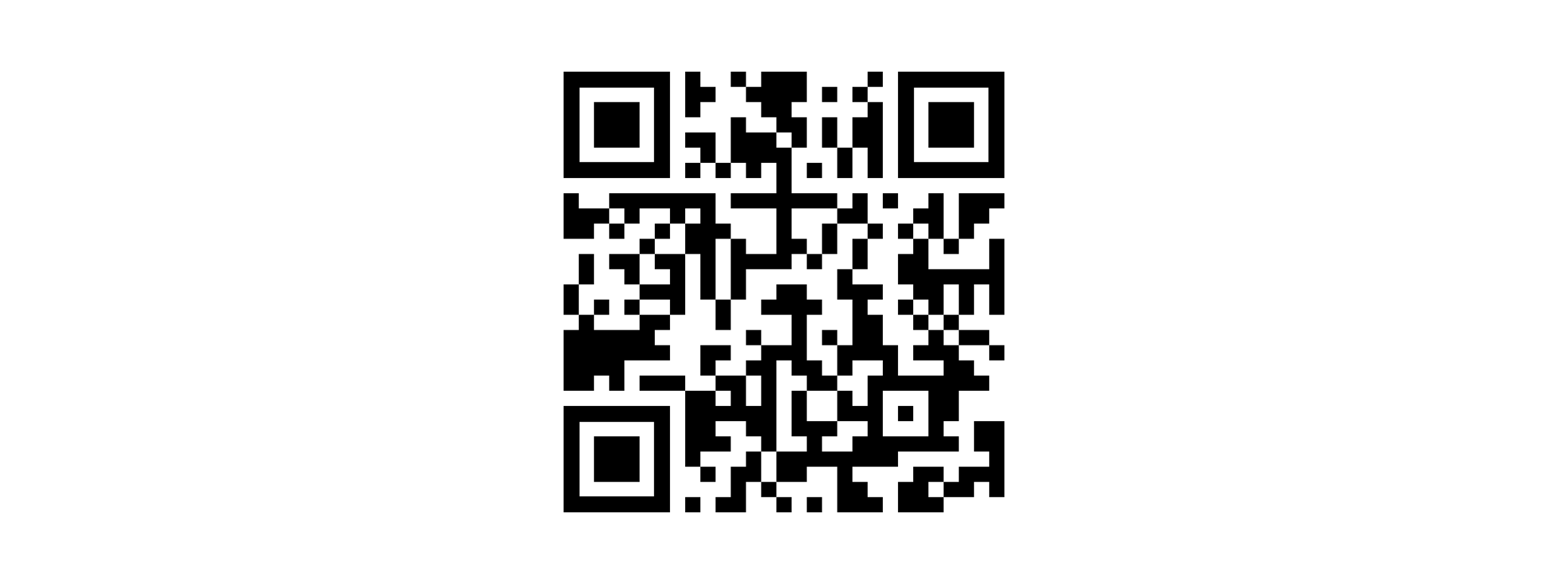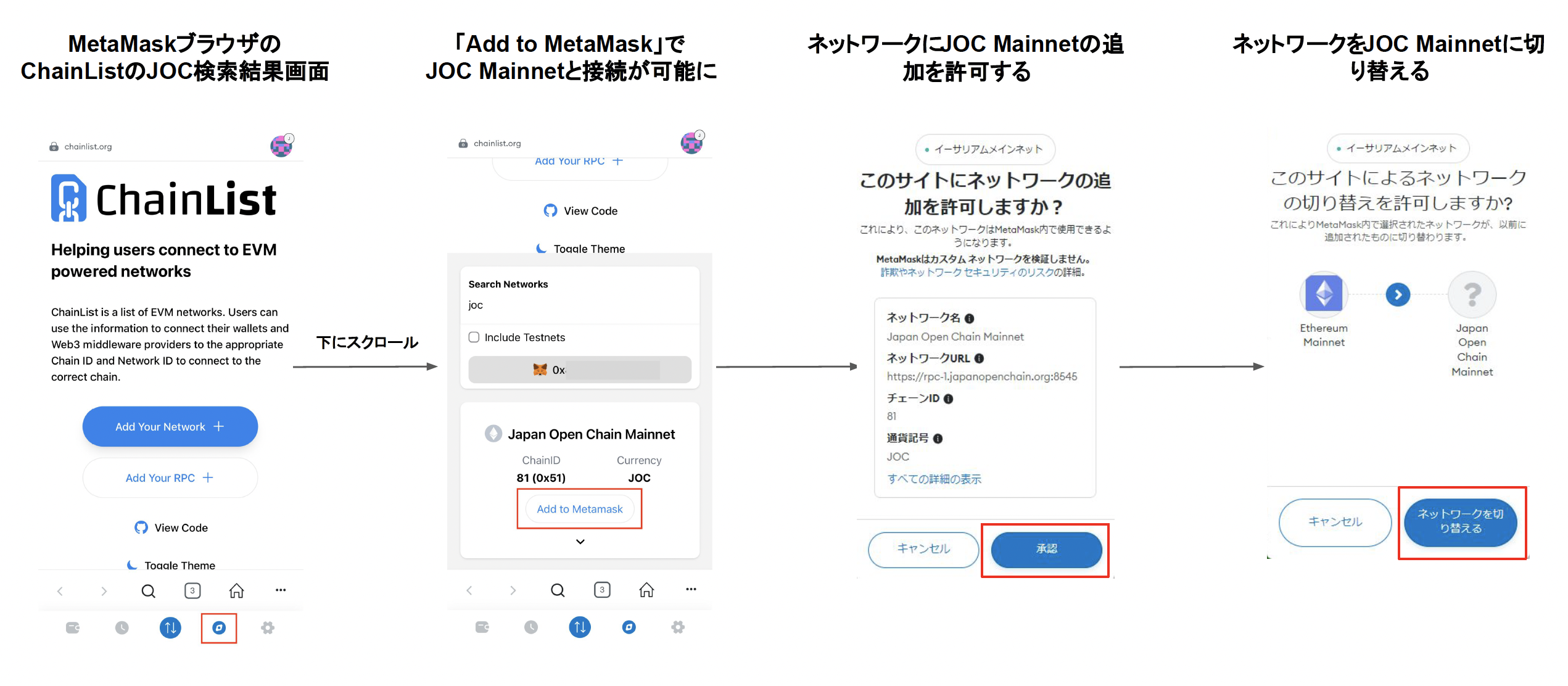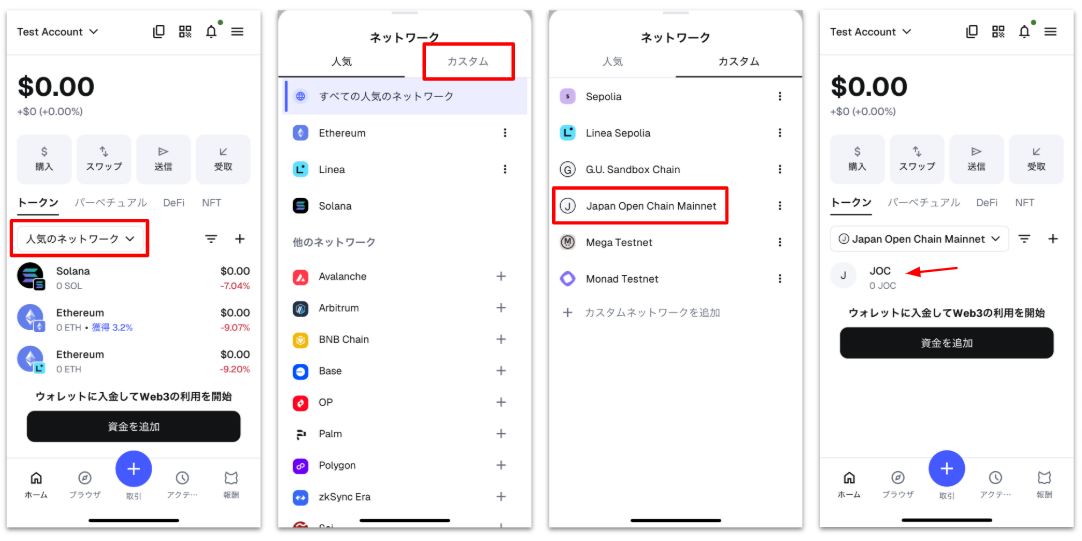FAQ
What are the main features of Japan Open Chain?
It is a blockchain that uses the Proof of Authority (PoA) for its consensus algorithm to reduce scalability and costs while maintaining full compatibility with Ethereum. In addition, it is fast and inexpensive, and anyone can use it for web3business with confidence by choosing a highly reliable Japanese company as the validator.
How can I use Japan Open Chain?
Please access the JOC Dashboard, a web application available to all Japan Open Chain users.
Who can use Japan Open Chain?
The JOC Consortium regulations allow for any company or individual who agrees and adheres to its terms to provide services on the JOC platform, regardless of where they reside in the world.
Is it compatible with external wallets?
You can use any wallet that is compatible with Ethereum.
How long does it take to complete a transaction?
While Bitcoin is capable of performing about 7 transactions per second (7TPS) for worldwide requests, and Ethereum about 11.3 transactions per second on average, JapanOpenChain is capable of performing thousands of transactions per second for sending native tokens and hundreds of transactions per second for executing smart contracts.
What is the consensus algorithm?
It is a method of agreeing on the generation of blocks. JapanOpenChain uses the PoA.
What is Proof-of-Authority?
PoA is less decentralized than the PoS but offers superior scalability and high speed. Japan Open Chain uses this algorithm to achieve significantly faster transaction speeds than the Ethereum mainnet.
What are the benefits of Proof-of-Authority?
Using PoA for its consensus algorithm will reduce scalability and cost while maintaining full compatibility with Ethereum. We adopted the PoA because we consider it to be a leading choice as an infrastructure that allows companies and individuals to do business with confidence in that it is operated by a trusted Japanese company in compliance with Japanese law and ensures sufficient speed, decentralization, and a high level of security and stability.
Does Proof of Authority have finality?
"Probabilistic" finality is seen in PoS, where the time it takes for a block to be confirmed is not fixed, PoA achieves a fast "100% finality" that meets the demands of the financial industry.
What is different from Ethereum mainnet?
Ethereum mainnet is a blockchain that operates with tens of thousands of nodes worldwide using PoW. While it is highly decentralized, it has issues such as slow transactions and high fees. Japan Open Chain is Ethereum fully compatible chain. It is less decentralized because the node operators are limited, but it offers fast transactions and low fees. In addition, by limiting the node operators to trusted Japanese organizations, this chain becomes a public blockchain with sufficient decentralization, practicality, and legal security.
Is this a chain on Layer 2?
Japan Open Chain is a Layer 1 chain. Layer 2 technology still has difficulties in decentralization, legal stability, and technical methods, and there are still various issues before it can be used for the business.
Is it a private chain?
Japan Open Chain is a public Ethereum-compatible chain. It is operated in compliance with Japanese law by a trusted Japanese company and is designed as a consortium public chain that ensures sufficient speed and decentralization as well as a high level of security and stability.
What do you think about dispersibility?
Although PoA is less distributed than PoS for validators, it offers superior scalability and high speed. Japan Open Chain uses this algorithm to achieve significantly faster transaction speeds than the Ethereum mainnet.
Where can I check the endpoints?
You can check it out from this link.
/docs/developer/connect-joc/rpc-endpoints/
What can I do on Japan Open Chain?
Various projects have already been launched on the Japan Open Chain. In particular, due to its features, this chain is particularly well suited for projects that need to comply with Japanese laws, such as finance and local government, and efforts in such areas are underway. Any company or individual that agrees and complies with the terms and conditions stipulated by the JOC consortium administrator can offer their services on the JOC. Various tokens and smart contracts will continue to be deployed on the Japan Open Chain.
What is the node and how can I be involved in the validator?
It is a computer that participates in the blockchain network, which stores, disseminates, and archives blockchain data and also processes transactions. If your company is interested in participating in Validata, please contact us using the contact form.
https://www.japanopenchain.org/contact
Where can I get commission tokens?
A testnet coin for development is currently available here for those who are interested in using it to develop on the Japan Open Chain.
How can I check the history of my blockchain transactions?
You can check it out from this link.
https://explorer.japanopenchain.org/blocks
Is the chain specialized in financial services?
It is not limited to financial-specific applications, but we believe that this chain is effective for use in the financial industry because of its necessary decentralization, high security performance and stability, and operating in compliance with Japanese law by a trusted Japanese company.
Is Rollup technology supported?
At present, we only support the anchoring technology. Rollup technology is a very promising technology and we are considering adopting it in the future when the technology is advanced enough.
Do you provide an SDK for the service?
It is available at the following page.
https://gusdk-docs.gu.net/en/docs/learn-sdk
What are your thoughts on quantum resistance?
When quantum computers become widespread, the introduction of cryptography with quantum resistance will be necessary. Discussions regarding the adoption of quantum-resistant cryptographic techniques are already taking place within the Ethereum community. While it is expected to be quite some time before quantum computers become practical and widespread, preparations are essential. Japan Open Chain is committed to addressing the quantum resistance issue in collaboration with the Ethereum community.
How to check your NFT
■Check NFT on JOC Dashboard
Step1. Access JOC Dashboard
Connect the wallet used for purchase and log in to display your NFTs.
JOC Dashboard: https://app.japanopenchain.org/en
How to use JOC Dashboard: https://www.japanopenchain.org/docs/dashboard/how-to-use
■Check NFT on MetaMask (Import to MetaMask)
Step1. Get the information needed to import to MetaMask from JOC Dashboard
Connect the wallet used for purchase and log in to display your NFTs. When you select an NFT you want to import to MetaMask, the following information needed for importing to MetaMask will be displayed.
- Address (Contract Address)
- ID (Token ID)
JOC Dashboard: https://app.japanopenchain.org/en
How to use JOC Dashboard: https://www.japanopenchain.org/docs/dashboard/how-to-use
Step2. Add "Japan Open Chain Mainnet" to MetaMask's connected network
From MetaMask browser, access the "Japan Open Chain Mainnet search results page" in ChainList. Use the URL below or QR code (open in MetaMask) or search for "JOC" in ChainList.
ChainID is "81"

https://chainlist.org/?search=joc
MetaMask browser ChainList JOC search results page

Step3. Import NFT to MetaMask

How to check your JOC Coin
■ Check JOC Coin on MetaMask
Open MetaMask, select "All popular networks" → "Custom" → "Japan Open Chain Mainnet" to view your JOC Coin balance.
